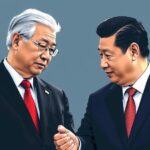Politics
ASIA, BEIJING, BIDEN ADMINISTRATION, BLOOMBERG ECONOMICS, BLOOMBERG NEWS, CHINA, CHINA CENTRAL TELEVISION, COMMUNIST PARTY, DONALD TRUMP, ECONOMICS, GEOPOLITICS, MEXICO, NATIONAL SECURITY, NORTH AMERICA, TRUMP, U. S, UNITED STATES, US-CHINA RELATIONS, WHITE HOUSE, WU XI, XI, XI JINPING
Sophia Klein
China Asserts Readiness to Tackle Trump’s Trade Tariffs
President Xi Jinping has made it clear that China is prepared to confront President Trump’s tariffs with retaliatory measures. As both sides exhibit signs of escalating tensions, the situation is causing global market volatility. China aims to strengthen its domestic economy while maintaining openness to negotiations, despite suggesting that it will resist intimidation by the U.S.
President Xi Jinping has indicated China’s readiness to combat the extensive tariffs imposed by President Donald Trump, making it clear that if a trade war is initiated by the United States, China is fully prepared to respond. Following a brief period of measured responses, China unveiled retaliatory blanket duties and stricter export controls on April 4, demonstrating a firm stance against U.S. trade policies. The Communist Party’s official publication subsequently noted that illusions of a favorable negotiation outcome have faded, although China remains open to continued discussions.
The global financial markets reacted strongly to China’s announcements, with heightened volatility as investors prepared for a potential prolonged trade conflict. President Trump exacerbated these concerns on April 7 by threatening an additional 50% tariff should Beijing maintain its retaliatory measures. He also indicated that all future negotiations would be suspended unless immediate action was taken by China.
As tariffs continue to rise—potentially exceeding current rates that threaten to eliminate bilateral trade—Chinese leaders are focusing on stimulating domestic economic performance. Recent meetings in Beijing resulted in discussions aimed at boosting consumption, with President Xi emphasizing the importance of unlocking consumer potential to sustain growth in light of escalating U.S. tariffs.
On this matter, Wu Xinbo from Fudan University remarked that China believes it must confront the challenge before negotiating a resolution. He pointed out the implications of a lack of communication between the two leaders, which has reached historic lengths since Trump’s inauguration.
The dynamics of this trade conflict have created a precarious situation for both leaders, wherein they must navigate national pride while addressing economic pressures. Xi confronts the dual necessity of projecting strength domestically while managing a deflationary economy, especially given the negative impacts on consumer confidence.
Several financial institutions have raised alarms regarding the potential economic ramifications stemming from these aggressive tariff policies, suggesting that they could severely impact China’s growth forecasts. Banks like Goldman Sachs and Morgan Stanley have indicated caution about China’s economic prospects, which are already projected to be low.
Should tensions escalate further, Beijing has several options it might pursue, including currency devaluation and tightening export controls on essential commodities. China is also expected to foster economic ties with other nations to compensate for U.S. trade disruptions, evidenced by recent calls for open trade cooperation with neighboring countries and the European Union.
As President Xi prepares for a forthcoming visit to Southeast Asia, he will observe how other nations respond to U.S. tariffs, particularly efforts that might mitigate the impact on China’s economy. The threat of increased protectionism from other economies is a concern, as they may attempt to shield their markets from an influx of Chinese goods.
Despite the mounting pressures, there is no indication that China seeks to isolate itself entirely from the U.S. Instead, it appears that China is asserting its position and preparing for a sustained confrontation while keeping pathways for future negotiations open.
China’s enhanced readiness can be attributed to lessons learned from previous encounters, leading to a diversification of trade partnerships, thereby decreasing reliance on the United States. In 2022, U.S. imports accounted for less than 15% of China’s exports, a significant decline from previous years. This strategic shift is apparent in the agricultural sector, particularly with reduced purchases of U.S. soybeans in favor of Brazilian imports.
Chinese experts suggest that the momentum of Trump’s tariffs may eventually wane, allowing China time to prepare for negotiations. Wang Yiwei stated an insightful analogy citing historical Chinese thought, suggesting that the initial fervor may diminish with ongoing conflict, indicating a potential shift toward resolution in time.
In summary, President Xi Jinping’s declaration signals China’s readiness to confront U.S.-imposed trade tariffs aggressively. The trade tensions are causing notable fluctuations in global markets while prompting China to bolster its domestic economy. Despite challenges posed by inflation and a declining consumer market, China seeks to navigate the trade conflict without severing ties with the U.S., emphasizing a strategic and unified domestic response.
Original Source: www.ttnews.com








Post Comment